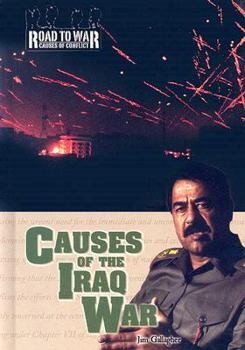Causes of the Iraq War
In March 2003, the United States and its allies launched an attack on Iraq, to remove the country's brutal and dangerous dictator, Saddam Hussein, from power. U.S. leaders expressed fears that Iraq... This description may be from another edition of this product.
Format:Library Binding
Language:English
ISBN:1595560092
ISBN13:9781595560094
Release Date:August 2005
Publisher:Ottn Publishing
Length:72 Pages
Weight:0.70 lbs.
Customer Reviews
2 ratings
Outstanding titles
Published by Thriftbooks.com User , 17 years ago
The "Road to War: Causes of Conflict" series from OTTN Publishing features outstanding titles that introduce young readers in grades 4 through 6 to the causes of five American wars over the last two hundred years that saw significant American involvement. This series includes: Causes Of The American Revolution, Causes Of The Civil War, Causes Of World War I, Causes Of World War II, and Causes Of The Iraq War. Each title presents a truly in-depth survey of the reasons for America's involvement in these conflicts along with an articulate explanation of events and concepts. The fourth grade reading level texts are enhanced with more than 25 color photographs, illustrations, and maps. Although Causes of the American Revolution and Causes of the Civil War are available in paperback, the sturdy library binding of the hard cover edition is recommended for school and library collections.
A comprehensive chronology of the events leading up to the Iraq War
Published by Thriftbooks.com User , 18 years ago
The first thing to understand is that we really do not have a historical perspective on the "Causes of the Iraq War" the way we do the American Revolution, Civil War, World War I and World War II, which are the other volumes in The Road to War: Causes of Conflict. George W. Bush is still in the White House and except for Colin Powell all of the members of the Bush administration listed among the Notable Figures at the start of Jim Gallagher's book still hold their positions. What these figures will say after they are out of office, when they start writing their memoirs, will provide information and insights that historians will find interesting. Then there is what might come out during the trial of Saddam Hussein, and while I think it is safe to say that few people expect any weapons of mass destruction to be found, you have to assume there are key things that are not known to the general public and the future historians of the Gulf War. Gallagher begins with "A Deadline for War," with Bush's ultimatum for Saddam to step down, based on the U.N. Security Council Resolution 1441, which gave Iraq a "final opportunity" to disarm. Saddam agreed to comply with UNSCOM inspections, but when initial reports indicated this was not the case, Bush declared Saddam's time had run out and 90-minutes after the deadline had passed, the Iraq War began. The next chapter, "Colonialism, Nationalism, and Oil," looks at the root causes for the Iraq War (and the Gulf War), coming back to when the Ottoman Empire took control of Mesopotamia. What is fascinating here is how Kuwait remained an emirate, since eventually so much oil would be discovered underneath it; if Kuwait had always been a part of Iraq, how different would recent history have been? This chapter does a good job of detailing the complex relationship between Iraq and Kuwait over the centuries. The third chapter, "Rising Tensions in the Gulf," focuses on how the rise of the Baath Party in Iraq and Iran becoming an Islamic republic led to the Iran-Iraq War. Gallagher explains how the aftermath of the war led Saddam to invade Kuwait. The Gulf War is covered in the next chapter, "The World Responds," as well as the aftermath with the conditions the U.N. Security Council set for peace, which included ordering Iraq to get rid of its chemical, biological, and nuclear weapons programs. What happens here is not so much an explanation of the causes, but a rather comprehensive chronology of events for a book aimed at this age group. The fifth chapter reveals the key causes of the Iraq War in its title, "The Threat of WMD." This is not a claim that Iraq had WMDs, but rather that in the context of September 11th, the "war on terrorism," and the invasion of Afghanistan, the threat of Iraq acquiring them warranted taking action. The key sentence in this chapter talks about how key players in the administration "argued that a preemptive war launched to prevent a future attack could be considered self-




